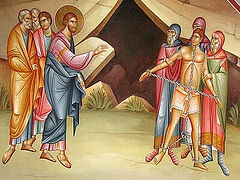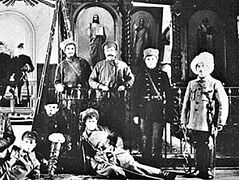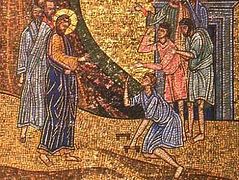With the blessing of Metropolitan Tikhon, the Pskov Diocese is hosting meetings with experienced priests of Russia and the Russian Diaspora. We offer to the readers of our website one such conversation held on May 22, 2022: Archpriest Gennady Fast from the Abakan Diocese of the Russian Orthodox Church presents his lecture.
 Fresco of Christ casting out a demon
Fresco of Christ casting out a demon
The service of liberation
Exorcism may be divided into two parts: hierarchical and charismatic. First: Jesus, upon calling His twelve disciples to Him, gave them the authority over unclean spirits, to cast them out and heal all kinds of sickness and all kinds of disease (Matthew 10:1). It is about the Disciples, with bishops as their successors; presbyters (a Greek word that literally means “elders” but also means “priests” and in fact is where the English word “priest” ultimately comes from—Ed.) as the bishops’ co-workers; and deacons as assistants in worship. That is, the Lord gave this power to the Twelve and not to everyone who was with Him. It may be called hierarchical. The hierarchy has such a gift and a mandate from the Lord Jesus Christ.
Secondly: these signs will follow those who believe (Mark 16:17). Five signs are mentioned, but we are concerned with the first one: In My name they will cast out demons. It speaks about those who believed. It isn’t the hierarchy. It isn’t the Twelve Apostles; consequently, it is neither the episcopate nor their coworkers, but those who believed and became the disciples of Jesus Christ. It is more common to speak these days about them as “baptized,” not as “who believed.” In other words, we are talking about Christians. So, they also receive power, and it is given as a sign. It will follow as a sign that in My name they will cast out demons. It is a general Christian charisma.
Thus, power is given twice: to the Disciples, and to everyone. It is said: He hath anointed Me to preach deliverance to the captives, to set at liberty them that are oppressed (KJV: “bruised”) (Lk. 4:18). The essence of the service is to proclaim liberty to the captives and free those who are oppressed. What are we oppressed with?
The service of Christ is the service of liberation. Thus, we can define what the Lord frees us from: first of all, He frees us from the power of sin—it is understood, through repentance: The blood of Jesus Christ washes the repentant sinner. Secondly, from the power of the devil. These two may look alike, but they focus on different things. Thirdly, we are freed from the power of death. Yes, we, too, are freed from the power of death, because, according to the Apostle Paul, to live is Christ, and to die is gain (Philippians 1:21). Death exists but we aren’t enslaved by it. But in the Old Testament, even Abraham, Isaac, and David were subject to death.
Death no longer holds sway over us, as death is our gain. We are not enslaved by sin, because there is the One Who cleanses and liberates us. We aren’t in the power of the devil, either. Now that we have introduced the subject I will quickly touch on terminology.
Not in the power of the devil
You’ve already gotten through your language courses, haven’t you? Well, I mean the ancient languages. You are in the process of learning, right?
What does “exorcism” mean? It is derived from “horkos” translated as “oath,” while “exorkízō” means “bind by oath.” Thus, our English term “exorcize” means, “to adjure/exhort.”
What does that mean? Even the Apostle Paul addresses his reader: “I exhort you…” to do such-and-such. What does the word “exhort” mean? We may understand it as: “I implore you to do this.” Paul has such words. We also saw it yesterday with Peter. We may also say: “I demand that you do this! I order you to do this!” Or: “I adjure you to do this!”
Certainly, it doesn’t happen often. A dying father may say something like it… Let us suppose that David exhorted Solomon not to leave the sin of Joab, his closest friend and military leader, without attention. So, in this case it is an exhortation.
That is, if you don’t do it, you are bound by an oath. You are bound to do something, and if you don’t, it won’t end well.… So, it becomes clear that it refers to the evil spirit, that you exhort it. It is akin to capital punishment. There are all kinds of punishments, and there is capital punishment.
The evil spirits somehow reveal themselves in a situation when we exert this particular extreme measure. The exorcism uses the words by Jesus, “In My name.” In other words, if someone wants to act single-handedly in this situation, he won’t get anything but a visit from the evil spirit in response. In Christ’s name—they wouldn’t submit to anyone else. In the name of Jesus Christ…
In Christ’s name—they wouldn’t submit to anyone else
So, as a result, through the mouth of the exorcist, Jesus adjures this spirit to come out. If he objects, he will be oath bound.
But who is exorcized? It’s quite interesting. We are used to our common word use, reading the [Russian] text of the Gospel, the Holy Scripture. We understand the etymology there.
But there are certain peculiar details. Who is exorcized? There are three names used in the New Testament. The first one is a daimonion. An unclean spirit is a demon.
A demon is an evil spirit, known as “bes” in Russian. This particular word is used only once1 in the New Testament—in the story with the Gadarine [or “Gergesene” in Matthew—Ed.] demoniac. Instead, the word “daimonion” is used elsewhere. And what is that? It means, “possessed by demons.” As for exorcism, we don’t exorcise the demon, but the possessed. It gives ground for more comprehensive theological research.
What should we derive from the above? It is like, you know, the word “green”—that is, an ecologist. We use the adjective in place of the noun. The same here: The daemonion of the possessed is exorcised, despite the fact that it is used as an adjective.
What’s the meaning of this? I’m not sure. I suspect that no one really knows. Some of the spiritually enlightened elders with a truly profound knowledge of the spiritual realm may know, but they were never in a hurry to share their knowledge with others.
The second term, “unclean spirit,” was used twelve times, and a third one, “evil spirit,” was used six times in the New Testament.
One exorcist said that he never had the impression that he was dealing with a personally identifiable being. In other words, it wasn’t a demon, but the daemonion. Some kind of ugliness or disgrace—filthiness. And this ugliness needs to be removed.
Some kind of ugliness or disgrace—filthiness. And this ugliness needs to be removed
By the way, what’s interesting is that there is no word for “possessed” in Greek. It doesn’t exist. What it has is “demonized,” or the “one who has come under the influence,” and it corresponds to the Russian word for possessed, besnovaty. Because now Christ is the King—but a believer can be demonized, or filthy. Great saints could pray: “O Lord, be merciful to me, a sinner.” It suggests a certain level of involvement with evil. But “possessed” means power or authority. It is as if Christ never came to earth, and the unclean spirit runs the show. But that isn’t true!
What’s the origin of the word “possessed”? It has appeared in two translations: the first one is in the Church Slavonic. And in English, it is also used in the King James Bible. By the way, other translations into various European languages do not have such a word.
It is of great importance for us! We have to understand that Christ is the Master, otherwise we live sometimes as if He had never come down to the earth, as if it were still ruled by the evil spirit. But the only thing the evil spirit can do is to stain, smear, or desecrate everything with his presence; however, as for being a master of things—well, maybe only those men who voluntarily give themselves to him. This kind of thing does happen—for example, as we say, when someone “cuts a deal with the devil,” right? We can remember Faust, where there is a description of something like this.
Christ the exorcist.
Then they were all amazed, so that they questioned among themselves, saying, “What is this? What new doctrine is this? For with authority He commands even the unclean spirits, and they obey Him.” And immediately His fame spread throughout all the region around Galilee (Mark 1:27). We read it and, because of our Christian perception, we think that everything sounds right, and that’s how it all happened. But there are actually some interesting hidden details.
Look: Lord Jesus casts out unclean spirits and the people say: what new doctrine is this? Then, Jesus Christ heals the sick—is it also a new doctrine? Were there healings of the sick in the Old Testament times? There were. When Jesus raises people from the dead, does it mean it is a new doctrine? Was anyone raised from the dead in the Old Testament? Yes. But who among the righteous could cast out demons? Moses, Abraham, David, Isaiah?... No one. They healed the sick, raised the dead, but they didn’t cast out demons. The question is, why not?
They held no power over him. He was the prince of this world. No one argues with a prince—neither Moses, nor Abraham, nor David. He was the prince of this world.
But then Christ comes and says: Now is the judgment of this world; now the ruler of this world will be cast out (John 12:31). In other words, Christ came and destroyed the works of the devil and he is no longer the prince of this world. Not too long ago, we had the Jehovah’s Witnesses treading our streets, right? They’d pass out the leaflets and there was one called, “Who rules this world?” Their answer was: “Satan.”
Christ came and destroyed the works of the devil, so he is no longer the prince of this world
I recall how I even argued with them once. I told them: “No, it isn’t Satan but Christ. He became King, His Cross had the sign: “Jesus of Nazareth the King of the Jews”—and we are the Israel of God, according to the Apostle Paul’s Epistle—He who is the King of kings and Lord of lords. That is, everything has changed dramatically and radically.
Even if Abraham, Moses, David, and—who else?—Prophet Elias taken alive on the chariot up to heaven—couldn’t cast out demons, now, in My name they will cast out devils… (Mark 16:17). I should say!
But why? Because before, their power was allowed by God. As for now, the devil no longer has power in this world, but the devil exists. What is his status? Let’s say, do we still have thieves or robbers? What social standing do they have? Are they the government? All of them, be it a bandit, a thief, or a robber—are afraid of the police. The police chase after them. Policemen are exorcists who chase these hooligans. And they put them in jail. So, the power of the devil and demons has remained in this world since the time of Christ in the form of hooliganism. So that’s what they do, they are messing around in this world. The devil, according to the Book of Revelation, is sealed. That means he is deprived of his power. But before, he was the prince of this world.
So, we must get a full grasp of it. We will breathe a sigh of relief once we get it. It truly means—to proclaim liberty to the captives, to set at liberty those who are oppressed. So, that’s it—we can now walk along the streets of our towns in peace.
We know that even now… Yes, demons exist. That is, we can live in peace but we have to stay extremely vigilant because they exist in the capacity of hooligans, to incite trouble. But they don’t rule this life. No!
Because we have so many faithful who suffer from a fear of demons and they think that the demons rule this world… They rule no longer—Christ rules. Only, Christ’s Kingdom has two stages: the first one is taking place now and we are already in His Kingdom; the second one will be after His Second Сoming, in which God is all in all.
So many faithful ... suffer from a fear of demons and they think that the demons rule this world
But in either case, Christ reigns already. Only in our time He rules as, for example, our rulers reign—in the presence of thieves. But then He will reign in their absence. Because the devil and sin will be taken away. They will no longer exist.
But at this point, we still have them. So, if we have them, we also have police and exorcists. Hooligans are lurking around as well, but we have to work to limit their activity and cast them out, isolating them.
The gift of exorcism in the Church
Well, we have already read that the Lord bestowed these two gifts—hierarchical and charismatic exorcism. How do they manifest themselves and to what extent?
Speaking from an historical perspective: In the first century, practically everyone was blessed with those gifts. Not because of a special kind of piety—just yesterday they were pagans who recently converted. When we read the Epistles, we often hear the Apostle giving some odd-sounding commentary, one that, so to speak, isn’t too relevant for a modern-day Christian… But in his time, he had to say those things because his new Christian listeners had just yesterday been pagans.
Tertullian. He was a teacher in Carthage in the first half of the third century. In his debates with the pagans he talked about spiritual gifts, and they said the following in response: “But we’ve got those, too. We’ve got our prophets, the Delphic oracles, and others.” Tertullian responds: “Give me any one of your so-called prophets, and may the blood be shed of that Christian in whose presence your prophet’s spirit will not reveal his demonic nature.”
Look, he could say it this way in his time; as for us, I’d refrain from repeating his words. These days, we definitely can’t do such experiments with just any Christian.
So, what’s going on there? It doesn’t mean that anyone was able to cast out demons, but that the evil spirit begins to manifest itself. It begins to show its demonic nature. But when there is no Christian around, the possessed looks like a prophet.
Let’s say we have clairvoyants in our days, right? Bring us any Christian… For instance, I can cite an example from my youth…
A hypnotist… The Soviet regime treated hypnosis quite reverently and even placed big bets on it. Especially the authorities, as it was assumed that with its help, they could achieve a great deal.
So, let’s say a hypnotist enters a classroom. “Children, think of any writer.” They do. Among the students in this classroom was a deacon’s son. So, he came up with a name—Matthew. He only thought of it but did not say it aloud. And this clairvoyant says: “Aha. Mayakovsky, sure; Esenin here; Tolstoy there…” And he guesses all of them right! The class gets really quiet, while he keeps saying and guessing the names right. Suddenly, he looks at this boy… “You didn’t think of a writer…” He says: “Yes, I did.” “No. He isn’t a writer!” “Yes, he is!” “Go away, you are getting in my way!”
Look at this deacon’s son—Vasya, I think was his name—who later became a priest. He didn’t know about any evil spirit. But the power of this false prophet—that’s what he was, right?—made its demonic nature manifest. So, it was in accordance to Tertullian.
He was a modern-day high school student, and he certainly was no great ascetic with great spiritual gifts, nor was he any kind of saint. Just a simple boy, that’s all. A believer, who confessed and had Communion, read the Gospel, attended church, helped with the incense burner and lit candles—and that’s all. But you see what kind of reaction he got.
So, the evil spirit manifests itself immediately upon coming into contact with Christ. So, it is revealed that he is no longer the prince of this world. Had he been, that would’ve been different. He’d either have guessed, or there would have been a different scenario. But this scenario was written for a hooligan. A hooligan, so to speak, was invited into the classroom. But with this boy out there, he couldn’t cause a disturbance. Because he ran into an armed policeman, and he couldn’t mess around any longer. The boy was armed with the Cross of the Lord, and the Name of Christ.
So… In the third and the fourth centuries there is already evidence that the Church had precisely this office of exorcists. As in our days, we have sub-deacons, readers, choir directors, and chanters. There was an office of exorcists. They weren’t ordained. They weren’t bishops, presbyters, or deacons.
The exorcist was promoted by a bishop. Synod of Laodicea, Canon 26 says: “They who have not been promoted [to that office] by the bishop, ought not to adjure, either in churches or in private houses.” So, let’s say, no one can be a sub-deacon, of course, if the hierarch didn’t give his blessing… Well, basically, he had to perform the laying on of hands (kheirotonia—“ordination”); but in practice, he could often simply give a blessing to perform certain functions of a subdeacon without the laying on of hands.





